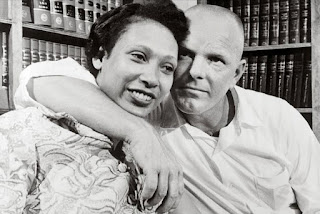So of course I am thrilled to be a part of Loving v. Virginia, a musical by Marcus Gardley with music by Justin Ellington, conceived and directed by Patricia McGregor. The piece had a first workshop at Williamstown Theatre Festival and will have its next incarnation at Vassar. And the true story it is based upon, its themes and message, could not be more timely in 2015.
 |
| Mildred Jeter Loving and Richard Loving in 1958 |
 |
| Anti-Marriage Equality protesters, 2015 |
 |
| Anti-Interracial Marriage protesters, 1968 |
An astonishing story that I knew nothing about until being invited to work on this piece. And how incredibly relevant and important it is today for 2015, on so many levels. The very recent Supreme Court ruling which has made same sex marriage legal in all states, despite protest and threatened resistance by several states (predictably mainly Southern ones) could not have happened without the Loving case.
With a distinctly virulent rise in our country of racism and Southern white conservative backlash, including a wave of blatant, racially motivated police brutality events; a movement to preserve the Confederate flag; and conservative southern states fighting to uphold states' rights regarding the retention of discriminatory laws, cloaking their motives in religious liberty arguments... all these themes are represented in the Loving's story and in the musical Loving v. Virginia, a provocative moment to show how far we have come as a country and how so much is mired in the same bigotry the Lovings faced.
 |
| R. Garnett Brooks, late in life |
My work as an actor has long been chameleonic, if you will; I have sought out every opportunity to transform myself as an actor, immersing myself in a wild variety of characters, stretching my physical and imaginative limits. Sheriff Brooks could not be further from who I am, my beliefs, and my background. I'm an openly gay man, raised Jewish in an interfaith household in the northeast, by parents whose views and beliefs were liberal and progressive. My adopted sister is interracial, and she and I dealt with our own experience of persecution in our Massachusetts community in the 1970s. I staunchly support equality for all people, I believe in the diversity of American culture, and I passionately repudiate racism, bigotry and persecution, especially where it is enforced by law. So to play this man who is the polar opposite of all I stand for will be an incredible opportunity to find what humanity he has, to get into his head, and to play him with commitment as I join with the creators of this piece and everyone at Powerhouse Theater bringing this new work to life. For information and tickets, visit the festival website. I head up to Vassar next week, and am excited to get to work!
